
- 162 pages
- English
- ePUB (mobile friendly)
- Available on iOS & Android
Christian Experiences & Spiritual Growth
About This Book
Christian Experiences & Spiritual Growth addresses the search for satisfaction with heart and soul happiness. God and being a Christian are seen as its sources. The book defines who is a Christian and how to become one. It dodges none of the trials and temptations in the Christian life but explains how that God as Father, Jesus as Saviour and the Holy Spirit as Guide, Teacher and Comforter, constantly help towards victory, growth, and maturity. Prayer, reading and obeying God's Word have a pivotal role in the experiences of satisfaction and happiness and the truth that every Christian has a home in heaven is cheering.
Readers will gain spiritual knowledge and be able to correct erroneous practice as they read through the book with the Bible alongside, paying attention to the scriptural references on subject areas, put suggestions into practice appropriately and grow spiritually. Reading the book over many sittings will be more profitable than attempting to rush through it. I have employed an explanatory strategy for ease of understanding. For example, I have explained the meaning of some words, phrases, and terms in the body of the book and set out comparative tables to illustrate narratives in the text. These can be used for quick references and reminders.
Frequently asked questions
Information
Who Is a Christian?
“…And the disciples were first called Christians in
The answer to the question “Who is a Christian?” will vary greatly depending on whom you ask. To some, it means you were born in a Christian nation or you come from a Christian family and is a church attender. To others, it means you believe in Jesus or the religion that is based on Jesus’ teachings. Yet others use the word ‘Christian’ to speak of a deep personal relationship between Jesus Christ and an individual. The name Christian was given to the early followers of the risen Lord Jesus Christ, and it is still used to describe followers of Christ to this day.
1) “…So it was that for a whole year they (Paul and Barnabas) assembled with the church and taught a great many people. And the disciples were first called Christians in Antioch” (Acts 11:26).
2) “Then Agrippa said to Paul, ‘You almost persuade me to become a Christian’” (Acts 26:28).
3) “Yet if anyone suffers as a Christian, let him not be ashamed, but let him glorify God in this matter.” (1 Peter 4:16).
Believers then were called ‘Christians’ to indicate that they were followers of Jesus Christ. The same term is used for the ‘Christ ones’ of today.
The Bible teaches that good works do not make us acceptable to God or make us Christians. In other words, a person can live to a high moral standard, give money to feed the poor, go to church, and serve their neighbours, and yet not be a Christ follower or a Christian. Ephesians 2:8–9 says, “For it is by grace you have been saved, through faith, and not of yourselves; it is the gift of God, not by works, lest anyone should boast.” We must understand the biblical teaching that salvation (Being born again) is the gift of God.
(1) Although God’s creation and their own consciences reveal to them that there is one true God, they refuse to acknowledge Him.
(2) Although they have heard the gospel, they reject Jesus Christ and the work of salvation which He accomplished at Calvary (Mark 16:16; 2 Thessalonians 1:8–9).
Thus the person who is not a Christian is firstly, out of fellowship with God his Creator and with Jesus the Saviour of the world and secondly, he is bound for a place called hell.
Table of contents
- Foreword
- Preface
- Introduction
- Chapter 1: : Who Is a Christian?
- Chapter 2: Assurance of One’s Salvation
- Chapter 3: Baptism
- Chapter 4: Christian Fellowship
- Chapter 5: Separation
- Chapter 6: The Lord’s Supper (Breaking of Bread or Communion)
- Chapter 7: The Christian and the Word of God
- Chapter 8: Prayer in the Life of the Christian
- Chapter 9: The Old Nature and the New Nature
- Chapter 10: Some Distinguishing Qualities of a Growing Christian
- Chapter 11: Adjusting Your Christian Life to God
- Chapter 12: Love and the Christian
- Chapter 13: Forgiveness and the Christian
- Chapter 14: Temptation and the Christian
- Chapter 15: Joy and the Christian
- Chapter 16: Concluding Chapter